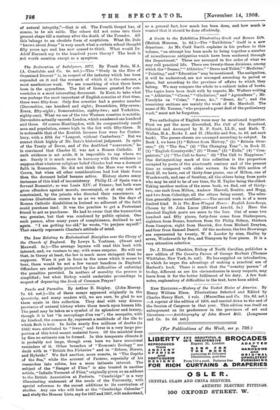The Declaration of Indulgence, 1672. By Frank Bate, M.A. (A.
Constable and Co. 6s. net.)—This " Study in the Rise of Organised Dissent" is, in respect of the industry which has been expended on it and the research of which it is the outcome, a most meritorious work. We see something of what these have been in the appendices. The list of licenses granted for con- senticles is a most interesting document. In Kent, to take what was perhaps the most important of English counties at that time, there were fifty-four. Only five counties had a greater number (Devonshire, one hundred and eight; Dorsetshire, fifty-seven; Essex, fifty-eight ; Somersetshire, eighty-two ; and Yorkshire, eighty-one). What we see of the two Western counties is notable. Devonshire actually exceeds London, which numbered one hundred and three. Of course Huntingdon, with its comparatively small area and population, comes high in the list with fifty-three. It is noticeable that of the Kentish licenses four were for Canter- bury, with a fifth for "Lonport, without Canterbury." But we cannot think highly of Mr. Bate's historical judgment. In spite a the Treaty of Dover, and of the deathbed "conversion," he is convinced that Charles II. was not a Roman Catholic. If ouch evidence is set aside, it is impossible to say where we are. Surely it is much more in harmony with this evidence to suppose that whatever religious belief Charles had was a dormant faith in Romanism. He did not think the Mass was worth a Crown, but when all other considerations had lost their force then the dormant belief became active. History shows many instances of this kind of inconsistency, Philip II. of Spain was a fervent Romanist; so was Louis XIV. of France; but both were gross offenders against morals, encouraged, or at any rate not constrained, by the priests who directed their consciences. A curious illustration occurs to us as we write. In the days of Roman Catholic disabilities in Ireland no adherent of the faith could purchase land. It was the practice to get a Protestant friend to act as purchaser. He had to swear that the transaction was genuine, but that was condoned by public opinion. One such person, after many years of complaisance, declined to act again. ." I am getting too old," he wrote, "to perjure myself." That exactly represents Charles's attitude of mind.










































 Previous page
Previous page